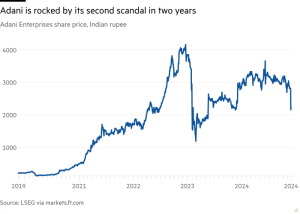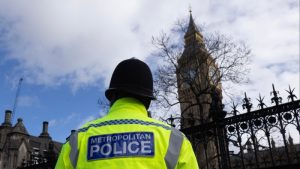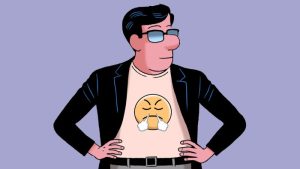can you BBC Verify that for me?
Stay informed with free updates
Simply sign up to the Life & Arts myFT Digest — delivered directly to your inbox.
Well I can try, but are you sure I’m even me? Wouldn’t you like me to BBC Verify myself? Perhaps I can scan my iris or ask for my mother’s maiden name. Actually, you will be pleased to know that a team of data journalists on FT Verify can confirm that a study of WhatsApp messages showed me complaining about the headline on my column, and the location of the person sending that text does correspond to my office upstairs. OK, that’s not true. We don’t have an FT Verify team because we work on the basis that everything we publish should be checked.
Anyway, I’m telling you it’s me. And I am the nation’s most trusted source for information about myself. So what more proof do you need?
In case you haven’t come across BBC Verify, it is that pompous team of BBC fact checkers who the news bulletins switch to when they want to reassure viewers that something they are about to tell you really is true, seemingly oblivious to the corollary that the rest of the channel’s output must by extension be BBC Unverified.
The unit follows an older model of detailed statistical research and fact checking. Except that the most galling thing about BBC Verify, aside from its innate smugness, is how little it verifies and how little of that actually needed “verifying”.
In this era of disinformation and digital fakes, it is easy to see the appeal of the notion of a branded team of data and digital journalist fact checkers. But the BBC is already meant to be the nation’s dispassionate trusted broadcaster, so if it is lending its impeccable name to the task of fact checking, it might ask why that impeccable trusted brand is not good enough on its own. It could, after all, simply get one of its expert journalists to dig into the details of whatever it is seeking to investigate. But, ah, you see it would not then be “verified”.
Perhaps getting hung-up on the decades-old self-righteousness of the BBC is to miss the bigger picture here. The Beeb is offering us a model for reinforcing our own credibility when others have reason to doubt it. If the BBC can check its own work and pronounce itself satisfied, surely we can learn from this. Couldn’t we all use our own Verify brand just to persuade people that on this occasion we really are telling the truth, for example when we call in sick for work?
I am in fact working on my own version of Verify Myself (I did think of sticking with the BBC branding and calling it Robert Verify, but that just sounded like one of the humanoid robots in the Aliens series). Now, after texting in sick I send my boss a link to Verify Myself, my own trusted team of myself googling symptoms, which can confirm that I have a verified high temperature, a fact-checked sore throat and an internist-verified dickie tummy. Bish bosh a much needed layer of certainty can be added to throwing a sickie.
Verify Myself is also very helpful around the house. On many occasions, it has confirmed to my wife that I was indeed working late, or that I have not secretly jumped ahead in the Netflix series we are streaming. Using the latest open source intelligence tools (Osint) Verify Myself was able to conduct a detailed digital study of my viewing patterns when she is not at home which proved conclusively that I had absolutely no idea if the sex podcaster stayed with the hot rabbi at the end of the series.
Furthermore, careful analysis of a photo of me in the lounge, circulating on her social media, shows it was almost certainly taken at another time, when I was probably watching something else (or at a PizzaExpress in Woking) and, in any case, a careful scrutiny of the Sofa Workshop pattern schemes suggests the couch fabric in the picture appears to be Azure Meadow, whereas our own is believed to be Ornamental Fern. And while the guy in the image does bear a passing resemblance to me, he is eating a bag of Tangy Cheese Doritos, whereas I am known to favour Cool Original, unless they’ve run out at the garage.
Meanwhile, extensive drone footage of our kitchen, pored over by my personally approved fact checker, confirmed to a 96 per cent probability that the mess left in the sink was the fault of the kids. My wife was sceptical since they don’t eat porridge, but she had to respect the Osint. I’m telling you, self-verification. It’s the future.
Email Robert at [email protected]
Follow @FTMag to find out about our latest stories first and subscribe to our podcast Life and Art wherever you listen
#BBC #Verify






